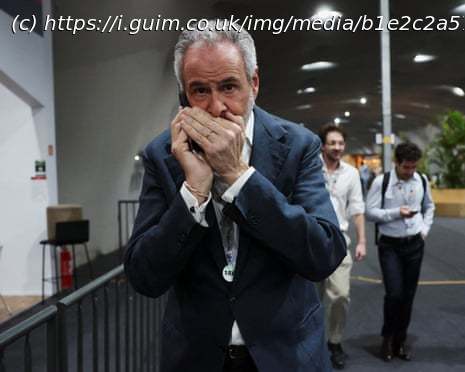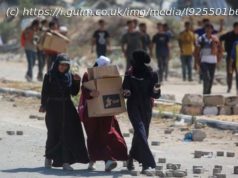Wealthy countries agree to triple funds for countries to tackle climate impacts, but deforestation and critical minerals blocked from final deal
Wealthy countries agree to triple funds for countries to tackle climate impacts, but deforestation and critical minerals blocked from final deal
The world edged a small step closer to the end of the fossil fuel era on Saturday, but not by nearly enough to stave off the ravages of climate breakdown.
Countries meeting in Brazil for two weeks could manage only a voluntary agreement to begin discussions on a roadmap to an eventual phase-out of fossil fuels, and they achieved this incremental progress only in the teeth of implacable opposition from oil-producing countries.
The talks were hauled back from the brink of collapse in an all-night session into Saturday morning, after a bitter standoff between a coalition of more than 80 developed and developing countries, and a group led by Saudi Arabia and its allies, and Russia.
There was disappointment from campaigners, but relief that the talks had produced at least some progress. Developing countries achieved part of their goal at the global talks, which was a tripling of the financial support available from rich countries to help them adapt to the impacts of the climate crisis. They will receive $120bn (£92bn) a year for adaptation, from the $300bn developed countries pledged to them last year, but not until 2035, instead of the 2030 deadline they were demanding. Many had also hoped the increase would be on top of the $300bn.
A roadmap to the halting of deforestation was dropped from the final deal, a bitter disappointment for nature advocates at this “rainforest Cop” held in Belém, near the mouth of the Amazon River.
The agreement among 194 countries – excluding the US, which did not send a delegation – was reached in the early morning after 12 hours of nonstop extra-time talks among ministers in deserted conference halls, and completed at a closing meeting at 1.35pm, after negotiations were hauled back from the brink of collapse on Friday evening.
Jennifer Morgan, the Cop veteran and former German climate envoy, said: “While far from what’s needed, the outcome in Belém is meaningful progress. The Paris agreement is working, the transition away from fossil fuels agreed in Dubai [at the Cop28 talks in 2023] is accelerating. Despite the efforts of major oil-producing states to slow down the green transition, multilateralism continues to support the interests of the whole world in tackling the climate crisis.
Домой
United States
USA — Science End of fossil fuel era inches closer as Cop30 deal agreed after...






